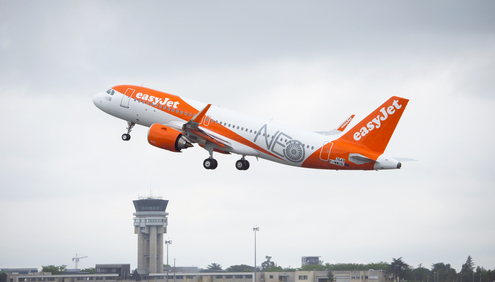easyJet has posted a full year pre-tax loss of £1.273bn, compared to a profit of £430 million in 2019. The board of easyJet has cancel dividend payments for this year in light of the loss.
Revenue at the airline fell by 52.9% to £3bn from £6.385bn a year ago. Total airline revenue per seat decreased by 10.6% to £54.35 compared to £60.81 in 2019.
Due to the impact of COVID-19, passenger numbers for the year ending September 30, 2020 decreased by 50.0% to 48.1 million compared to 96.1 million in 2019. Full year capacity decreased by 47.5%, with a 4.3 percentage point fall in load factor to 87.2% due to what easyJet describes as a “prudent approach to capacity”.
easyJet has been reducing costs throughout the year to minimise cash burn. Group headline costs excluding fuel were reduced by 30.8% thanks to material savings across many areas, including airport fees, ground handling, crew and maintenance costs.
easyJet incurred £438 million in non-headline costs during the 2020 financial year, which include a £38 million gain as a result of the sale and leaseback of 33 aircraft but a charge of £37 million for leased aircraft impairment charge. The airline also booked a £311 million charge related to hedge discontinuation and fair value adjustments, £123 million in restructuring costs and £400,000 in ongoing organisational and legal costs associated with easyJet's Brexit-mitigation programme (which cost £4 million in 2019).
In light of the hedging losses, easyJet has put jet fuel hedging “on hold” for time periods through to October 2021 but for the 2021 financial year its jet fuel requirement is currently around 77% hedged at $605 per metric tonne and its expected 2022 financial year jet fuel requirement is currently around 44% hedged at $490 per metric tonne.
The airline has managed to maintain a strong balance sheet, raising a total of £3.1 billion in liquidity during the COVID-19 period, with a net debt position of £1.1 billion compared to £326 million in 2019, while maintaining its investment grade credit ratings.
easyJet has signing two secured term loans totalling £400 million, issued £600 million of commercial paper through the Covid Corporate Financing Facility (CCFF), and has fully drawn down on a $500 million revolving credit facility, which is secured against aircraft assets. Between June and September 2020, easyJet raised £608 million through the sale and leaseback of 23 aircraft and states that it continues to engage with an active lessor market interested in acquiring further aircraft from its fleet on a sale and leaseback basis.
easyJet has also delayed the delivery of 24 aircraft to reduce capex and to better reflect its reduced fleet. The airline expects staff numbers to be reduced by up to 30%.
easyJet’s unencumbered aircraft is worth in excess of £1.9 billion, and it also retains a large and valuable slot portfolio.
Johan Lundgren, easyJet chief executive has commented that the airline is strongly positioned to be a leader in the recovery of the European airline industry
Lundgren reiterated the plan for easyJet to fly no more than 20% of planned capacity for Q1 2021, but states that it will maintain a “disciplined approach to cash generative flying over the winter” and retain flexibility to rapidly ramp up “when demand returns”.
easyJet states that its capital expenditure for the next financial year to September 30, 2021 is expected to be around £600 million. Other than reiterate is preparedness for the impact of Brexit, the airline has not provided any further future financial guidance for 2021.

